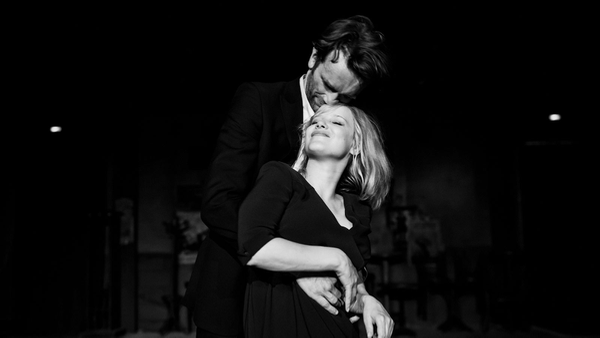Movie review by Greg Carlson
Another stunning work of perfectly placed ellipses and calculated restraint, Pawel Pawlikowski’s “Cold War” is a film filled with images as iconic and austere as its blunt title. A haunting experience of history by suggestion, the movie traces a tragic romance across years and landscapes, relying as heavily on Lukasz Zal’s arresting, monochromatic, Academy ratio cinematography as it does on the sharp editing by Jaroslaw Kominski. Pawlikowski collaborated with both of those craftsmen on Oscar-winner “Ida,” and “Cold War” is a gorgeous companion that is every bit as good, and possibly even better, than the celebrated 2013 title.
Clocking in crisply and efficiently at 85 minutes, “Cold War” wastes nothing, often presenting strings of diabolically economical short scenes to advance the narrative that focuses on musician/composer/conductor Wiktor Warski (Tomasz Kot) and singer/dancer/performer Zuzanna “Zula” Lichon (Joanna Kulig) as they come together and move apart and come together on both sides of the Iron Curtain. Pawlikowski dedicates the film to his parents and uses their names for his two protagonists. So skillful is the filmmaker at communicating in pure visual language, one need not know much about mid-20th century Eastern Europe to understand the challenges faced by artists trapped in the cogs of an oppressive political machine.
Along with the beautiful photography and knockout cutting, Pawlikowski laces “Cold War” with a soundtrack that captures the conflicting moods of clashing ideologies. Beginning with the rural folk and work songs sung by peasants and accelerating through small jazz combos and wild communist transpositions of swinging big bands, the fortunes and misfortunes of Wiktor and Zula are traced as much through the musical arrangements they perform together and separately as any dialogue they exchange with one another. At one exhilarating turning point, the infectious, magnetizing 12-bar blues of Bill Haley & His Comets’ “Rock Around the Clock” instantly pulls Zula from her stool to the dance floor and the bar top.
As star-crossed as Ilsa and Rick, Zula and Wiktor painfully discover that they can’t live with or without each other in just the same way that they cannot live with or without Poland. One bureaucratic official is disbelieving and incredulous when Wiktor petitions to leave Paris to return to his homeland. We understand, even though the decision guarantees something menacing and horrific. Among the many other echoes of “Casablanca” is a shot that mirrors Ilsa’s surprising late night visit to see Rick at the Cafe Americain. As an analogue to Mr. Blaine, Wiktor also happens to be his own Sam. He plays his own placeholders for “As Time Goes By” whenever the longing for Zula overtakes him.
Some viewers will adore the way in which Pawlikowski collaborates with his actors to create characters filled with the wholeness of familiar humanness, especially when the filmmaker withholds so much of the stuff we would expect in the presentation of a traditional screen romance. The pauses, the fades to black, and the spaces in between are all elisions that arouse deep curiosity, but also inspire us to wonder and imagine all kinds of things that Pawlikowski keeps from our eyes and ears. One of the best gifts of “Cold War” is that we never feel like we have been cheated.
